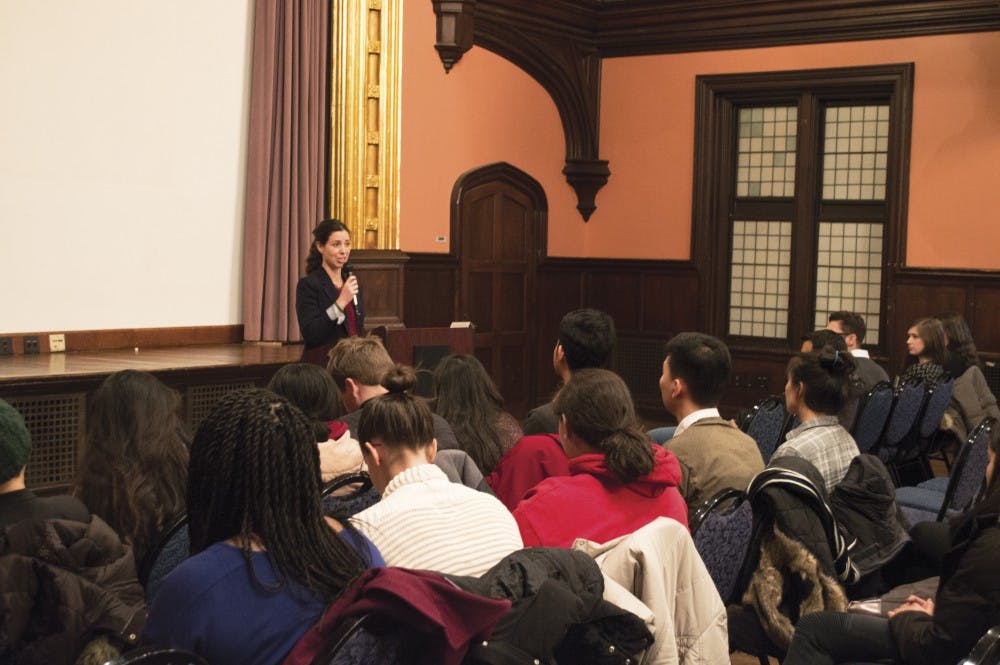
Student representatives from around the Ivy League shared their grievances and current campus policies about mental health.
Credit: Avalon MorellFrom Feb. 12 to Feb. 14, Penn hosted an all-Ivy conference on mental health titled “Unmasking the Ivy League.” The conference, which included students and administrators, was comprised of speaker sessions and collaborative workshops to help address the growing issue of mental illness on college campuses.
State of the Ivy League Student
Fifteen minutes into the conference on mental health, Penn representatives hadn’t even spoken. But many of the topics were so familiar it was hard to tell.
The conference kicked off with a session on the “State of the Ivy League,” where representatives from all the Ivy League schools except Dartmouth gave a brief presentation of current events relating to mental health, student and administrative response and resources that they have on their campuses.
Lack of diversity in counseling staff was likely the most-cited issue, with almost every school mentioning some sort of an initiative to hire more counselors that reflect the ethnicity and backgrounds of the students they serve.
The concept of food insecurity also received a lot of airtime. Though Penn’s representatives didn’t mention it, students from Columbia and Cornell spoke about how students on their campuses experience anxiety, from being low on dining hall swipes to, in the case of Columbia, not being able to afford to buy food in New York.
Brown and Yale representatives also aired grievances about session limits imposed on students who seek help from their equivalents of Counseling and Psychological Services. Although Yale’s administration clarified recently that the session limit isn’t a “hard” limit, the Yale representatives still said it can cause confusion and uncertainty for students who can’t afford to get help off campus.
The Yale representatives also spoke about Yale’s leave of absence policy. Students who are deemed a harm to themselves or others can be asked to leave campus, which can discourage people from getting the help they need for fear of being asked to leave. Yale also recently piloted online appointments for CAPS, which was one of the demands the Hamlett-Reed Mental Health Initiative made in September, but one that Penn has yet to implement.
Gender & Sexual Identity
Later on Saturday morning, Counseling and Psychological Services staff therapist Matt LeRoy and LGBT Center Associate Director Rebecca Schept co-facilitated a workshop that focused on how gender and sexual identity intersect with mental health.
The workshop began by defining important terms within the community, so as to allow for their proper usage in ensuing dialogue. Schept pointed out the tendency in our society to highlight people who still identify on the gender binary — such as Laverne Cox, Caitlyn Jenner and Chaz Bono — when we think of prominent transgender people. However, identities such as agender, genderfluid and non-cisgender also fall under the trans umbrella.
Attendees also discussed the experience of coming out. “Coming out happens daily for most people because we live in this heteronormative society where everyone assume you’re straight and cisgender until proven otherwise,” Schept said. “It’s this constant struggle of, ‘Is it safe to come out?’”
Fredrick Blaisdell, a senior at Cornell, said that the workshop made him think about how he benefits from heteronormative privilege, though he wishes more time could have been spent on discussing ways to deal with microaggressions, as opposed to merely what they are.
Amalya Megerman, a senior at Princeton, thought that the workshop was “really good at bringing multiple perspectives and multiple routes into understanding where mental health issues come from.”
“Intersectionality is at the forefront of this conference, which is really exciting and something that we’re all about and want to take as much as we can from,” Naimah Hakim, another senior at Princeton, said.
Changing our College Campuses
Saturday afternoon, Penn Benjamins, Active Minds, CAPSAB and the Consciousness Club co-hosted a workshop on creating and improving mental health initiatives. Though students from the organizing clubs were running the workshop, it was all discussion-based.
“When we were designing the workshop we were thinking there’s no content we can give you, really. We can just prompt a discussion,” said College sophomore and Penn Consciousness Club member Karen Zhao.
The event started with a large discussion on current mental health problems on Ivy League campuses. Participants mentioned sleep, stress culture, isolation and a fear of vulnerability as central issues students face at every school. Participants all agreed that if students were kind, honest and comfortable reaching out for help, then their campuses would be better places.
The room then split up into small groups of six or seven with representatives from every school in each group. After half an hour, each group shared what they had discussed.
Many schools had programs such as CAPS and peer counseling but felt that students were not aware of them or they were too stigmatized for students to view them as good resources. Students were encouraged by ideas such as better policies for mental health leave and an online system to make counseling appointments.
Each group also agreed that smiling more, noting what they are grateful for, being more of an active listener and not being afraid to reach out and be vulnerable were all personal changes they could make to improve their campuses.
“The people made this workshop successful,” said Tara Rajagopal, College junior and Penn Conciousness Club member. “We didn’t really do anything, we just asked questions. Each person here had so much value to add and that’s what made it successful.”
The Daily Pennsylvanian is an independent, student-run newspaper. Please consider making a donation to support the coverage that shapes the University. Your generosity ensures a future of strong journalism at Penn.
DonatePlease note All comments are eligible for publication in The Daily Pennsylvanian.








